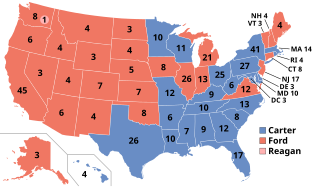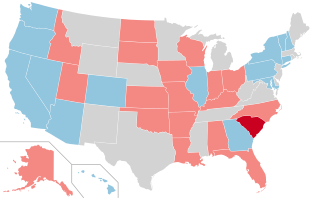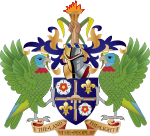
Presidential elections were held in the United States on November 7, 2000. Republican nominee Governor George W. Bush of Texas, the eldest son of 41st President George H. W. Bush, narrowly defeated incumbent Democratic Vice President Al Gore. It was the fourth of five U.S. presidential elections, and the first since 1888, in which the winning candidate lost the popular vote, and is considered one of the closest U.S. presidential elections in history, with long-standing controversy about the result. Gore conceded the election on December 13 after the Supreme Court issued its decision.

Presidential elections were held in the United States on November 5, 1996. Incumbent Democratic President Bill Clinton and his running mate, incumbent Democratic Vice President Al Gore were re-elected to a second and final term, defeating the Republican ticket of former Senate Majority Leader Bob Dole and former Secretary of Housing and Urban Development Jack Kemp and the Reform ticket of businessman Ross Perot and economist Pat Choate. This was the first election since 1944 in which an incumbent Democratic president was re-elected.

Presidential elections were held in the United States on November 2, 1976. The Democratic ticket of Jimmy Carter, the former governor of Georgia, and his runningmate Walter Mondale, the senior senator from Minnesota, narrowly defeated the Republican ticket of Gerald Ford, the incumbent president, and his runningmate Bob Dole, the junior senator from Kansas. This was the first presidential election since 1932 in which the incumbent was defeated, as well as the only Democratic victory of the six presidential elections between 1968 and 1988.

The Indian National Congress (INC), colloquially the Congress Party or simply the Congress, is a political party in India with deep roots in most regions of India. Founded on 28 December 1885, it was the first modern nationalist movement to emerge in the British Empire in Asia and Africa. From the late 19th century, and especially after 1920, under the leadership of Mahatma Gandhi, the Congress became the principal leader of the Indian independence movement. The Congress led India to independence from the United Kingdom, and significantly influenced other anti-colonial nationalist movements in the British Empire.

The incumbent is the current holder of an office or position. In an election, the incumbent is the person holding or acting in the position that is up for election, regardless of whether they are seeking re-election.

Presidential elections were held in the United States on November 4, 2008. The Democratic ticket of Barack Obama, the junior senator from Illinois, and Joe Biden, the senior senator from Delaware, defeated the Republican ticket of John McCain, the senior senator from Arizona, and Sarah Palin, the governor of Alaska. Obama became the first African American to be elected to the presidency. This was the first election since 1952 in which neither the incumbent president nor vice president was on the ballot, as well as the first election since 1928 in which neither ran for the nomination.

Presidential elections were held in the United States on November 2, 2004. Incumbent Republican President George W. Bush and his running mate, incumbent Vice President Dick Cheney, were re-elected to a second term. They narrowly defeated the Democratic ticket of John Kerry, a senator from Massachusetts, and his running mate John Edwards, a senator from North Carolina.
An independent politician or non-affiliated politician is a politician not affiliated with any political party or bureaucratic association. There are numerous reasons why someone may stand for office as an independent.
The Labour Party is a political party in the United Kingdom that sits on the centre-left of the political spectrum. The party has been described as an alliance of social democrats, democratic socialists and trade unionists. It is one of two dominant political parties in the United Kingdom, along with the Conservative Party. The party has been led by Keir Starmer since 2020. Starmer became UK Prime Minister and formed a Labour government following the 2024 general election. To date, there have been thirteen Labour governments and seven Labour prime ministers - MacDonald, Attlee, Wilson, Callaghan, Blair, Brown and Starmer.

Presidential elections were held in the United States on November 6, 2012. Incumbent Democratic President Barack Obama and his running mate, incumbent Vice President Joe Biden, were elected to a second term. They defeated the Republican ticket of former Governor of Massachusetts Mitt Romney and U.S. Representative Paul Ryan of Wisconsin, who later became Speaker of the House of Representatives.

Presidential elections were held in the United States on November 8, 2016. The Republican ticket of businessman Donald Trump and Indiana governor Mike Pence defeated the Democratic ticket of former secretary of state and former first lady Hillary Clinton and Virginia junior senator Tim Kaine, in what was considered one of the biggest political upsets in American history. It was the fifth and most recent presidential election in which the winning candidate lost the popular vote. It was also the sixth and most recent presidential election in U.S. history in which both major party candidates were registered in the same home state, the others being 1860, 1904, 1920, 1940 and 1944, with both nominees having been registered in New York.

The election of the president and for vice president of the United States is an indirect election in which citizens of the United States who are registered to vote in one of the fifty U.S. states or in Washington, D.C., cast ballots not directly for those offices, but instead for members of the Electoral College. These electors then cast direct votes, known as electoral votes, for president and for vice president. The candidate who receives an absolute majority of electoral votes is then elected to that office. If no candidate receives an absolute majority of the votes for president, the House of Representatives elects the president; likewise if no one receives an absolute majority of the votes for vice president, then the Senate elects the vice president.

Presidential elections were held in the United States on November 3, 2020. The Democratic ticket of former vice president Joe Biden and the junior U.S. senator from California Kamala Harris defeated the incumbent Republican president Donald Trump, and vice president Mike Pence. The election took place against the backdrop of the global COVID-19 pandemic and related recession. The election saw the highest voter turnout by percentage since 1900. Biden received more than 81 million votes, the most votes ever cast for a presidential candidate in U.S. history.

The 2024 United States elections were held on Tuesday, November 5, 2024. In the presidential election, former Republican President Donald Trump, seeking a non-consecutive second term, defeated the former Democratic Vice President Kamala Harris. Republicans also gained control of the Senate and held narrow control of the House of Representatives, winning a government trifecta for the first time since 2016.

The 2024 United States Senate elections were held on November 5, 2024. Regularly scheduled elections were held for 33 out of the 100 seats in the U.S. Senate, and special elections were held in California and Nebraska. U.S. senators are divided into three classes whose six-year terms are staggered so that a different class is elected every two years. Class 1 senators faced election in 2024. Republicans flipped four Democratic-held seats, regaining a Senate majority for the first time in four years, and the most gains since 2014.

Presidential elections were held in the United States on November 5, 2024. The Republican Party's ticket—Donald Trump, who was the 45th president of the United States from 2017 to 2021, and JD Vance, the junior U.S. senator from Ohio—defeated the Democratic Party's ticket—Kamala Harris, the incumbent vice president, and Tim Walz, the 41st governor of Minnesota. Trump and Vance were inaugurated as the 47th president and the 50th vice president, respectively, on January 20, 2025.

The 2026 United States Senate elections are scheduled to be held on November 3, 2026, with 33 of the 100 seats in the Senate being contested in regular elections, the winners of which will serve six-year terms in the United States Congress from January 3, 2027, to January 3, 2033. Senators are divided into three groups, or classes, whose terms are staggered so that a different class is elected every two years. Class 2 senators were last elected in 2020 and will be up for election in this cycle.

The 2028 United States Senate elections will be held on November 7, 2028, with 34 of the 100 seats in the Senate being contested in regular elections, the winners of which will serve 6-year terms in the United States Congress from January 3, 2029, to January 3, 2035. Senators are divided into 3 groups or classes whose terms are staggered so that a different class is elected every 2 years. Class 3 senators were last elected in 2022, and will be up for election again in 2028. These elections will run concurrently with the 2028 United States presidential election.

The 2024 United States House of Representatives elections were held on November 5, 2024, to elect the 435 representatives of the United States House of Representatives, as well as 6 non-voting delegates from the District of Columbia and inhabited U.S. territories. The elections were held together with other federal, state, and local elections, including the U.S. presidential election and elections to the Senate, as part of the 2024 United States general election. The winners of this election will serve in the 119th United States Congress, with seats apportioned among states based on the 2020 United States census.



















